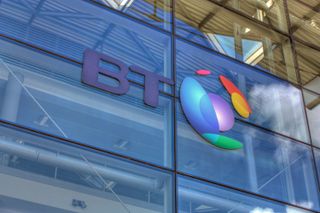TalkTalk: BT-EE merger will lead to 25% price hikes
Rivals fear for the future of telecoms after CMA approves £12.5bn BT-EE deal

TalkTalk claims BT will be more powerful than ever after its 12.5 billion takeover of EE was formally approved by the Competition and Markets Authority (CMA) today.
Go-ahead for the merger means BT can now develop a quad-play strategy, bundling up landline, mobile, pay-TV and broadband services for customers.
The CMA's seal of approval follows its preliminary decision to clear the merger in October last year, and it claimed today that the move would not kill telecoms competition in Britain.
Its inquiry chair, John Wotton, said: "The evidence does not show that this merger is likely to cause significant harm to competition or the interests of consumers.
"The retail mobile services market in the UK is competitive, with four main mobile providers and a substantial number of smaller operators. As BT is a smaller operator in mobile, it is unlikely that the merger will have a significant effect. Similarly, EE is only a minor player in retail broadband."
However, BT rival TalkTalk has hit out at the decision, claiming the move could lead to price rises of 25 per cent, if a similar proposed Three-O2 merger gets approval.
"We are disappointed, although not surprised," the company said in a statement. "It is dangerous that the regulator has looked at this merger in isolation, given the unprecedented levels of consolidation taking place in the wider telecoms industry.
Get the ITPro. daily newsletter
Receive our latest news, industry updates, featured resources and more. Sign up today to receive our FREE report on AI cyber crime & security - newly updated for 2024.
"The UK has long been one of the most competitive markets in Europe, but if the Three/O2 merger also goes through, this would end. Moving from four to three mobile providers will lead to price increases of 25% or more."
The firm added: "Given BT Group's increased size and scale, the need to ensure that the UK's broadband infrastructure is not neglected is more important than ever, and we have every confidence that Ofcom will take this into account when considering the future structure of Openreach."
ITSPA, the trade association for "next generation" communication services, also expressed major fears for the future of the communications sector after the announcement.
Chair Eli Katz said: "The competitiveness of the UK mobile sector is a genuine concern for our industry, and threatens to harm consumers and inhibit UK growth.
"ITSPA already had serious competition concerns around the market and we had hoped the CMA would have considered potential wholesale mobile remedies in its final report, when approving the proposed BT/EE merger."
It claimed the CMA panel's opinions had been split over the merger's effect on the mobile market, lamenting that this was not reflected in the ruling.
Editor-in-chief of Cable.co.uk, Dan Howdle, pointed this out too, before adding: "The CMA believes the new merged company is, by default, financially incentivised to continue to supply wholesale services to other providers (Virgin Mobile, for example runs on the EE Network), which will prevent it from closing its doors to third-party operators in an attempt to monopolise its own network infrastructure.
"The greatest concern for its competitors, then, is that, though unlikely as the CMA points out no firm measure has been put in place to actively prevent it.
Regulator Ofcom, which did not see any issues with the deal prior to the CMA's approval, simply said:"Ofcom has worked with the CMA on its review. We provided evidence and analysis about the effects of the deal, which the CMA has taken into account in its final decision."
BT now faces integration challenges
BT's CEO, Gavin Patterson, welcomed the announcement, saying: "The combined BT and EE will be a digital champion for the UK, providing high levels of investment and driving innovation in a highly competitive market. I have no doubt that consumers, businesses and communities will benefit as we combine the power of fibre broadband with the convenience of leading edge mobile services. I look forward to welcoming EE into the BT family".
While it plans to close the deal on 29 January, analysts have warned the firm faces several of its own difficulties now the agreement has official endorsement.
Saying it is inevitable that BT will rebrand EE, CCS Insight analyst Kester Mann added: "A greater priority for BT will be the complex task of reworking back-end and billing systems as it merges the UK's largest fixed-line and mobile operators, and only then should it start to articulate changes to consumers.
"BT's legacy association with fixed-line services could be a challenge for the company's mobile ambitions in the consumer market."




